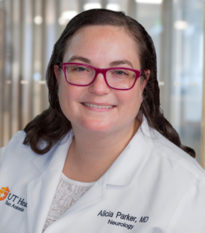Alicia Parker, M.D., and Mitzi Gonzales, Ph.D., of UT Health San Antonio will receive grant funding from the Texas Alzheimer’s Research and Care Consortium (TARCC), the organization recently announced.

Dr. Parker is assistant professor in the Department of Neurology and staff physician with the Glenn Biggs Institute for Alzheimer’s and Neurodegenerative Diseases. She will use her TARCC grant to explore the connection between diastolic heart problems, as assessed by echocardiogram, and brain structure and function. She will investigate the relationship between diastolic dysfunction and development of new mild cognitive impairment and dementia.
“Cardiovascular health, including that of the heart and blood vessels, is important to brain health,” Dr. Parker said. “Research has shown that having poor cardiovascular function can damage the brain’s ability to think. But the diastolic function of the heart, which is the heart’s ability to fill with blood, has not been well studied. This clinical study will help determine how often difficulty with cognition occurs when there is poor diastolic functioning of the heart, and what brain changes explain this connection.”
Patients will be enrolled from the neurology, geriatrics and cardiology clinics at UT Health Physicians, the clinical practice of the Joe R. and Teresa Lozano Long School of Medicine at UT Health San Antonio.
This TARCC grant is $220,000 over two years.

Dr. Gonzales, a neuropsychologist, is assistant professor in the Department of Neurology and a clinical provider on the Biggs Institute team. She will use her TARCC grant to establish novel blood-based biomarkers for Alzheimer’s disease.
The need for better diagnosis and treatment is obvious. At present, more than 47 million people suffer from dementia, and the global prevalence is predicted to nearly double over the next 20 years. Dementia is progressive, so patients can benefit from improved quality of life if their treatment is initiated sooner.
“Enhanced early detection, monitoring and treatment will be crucial for managing this growing epidemic,” Dr. Gonzales said. “The current gold-standard diagnostic assessments for dementia, namely magnetic resonance imaging (MRI) and positron emission tomography (PET), are costly and burdensome.
“Establishment of blood-based biomarkers for neurodegenerative disorders has significant potential to aid timely identification of affected individuals, predict disease progression, and monitor efficacy of newly emerging treatments,” she said.
This TARCC grant is also $220,000 over two years.
The Texas Alzheimer’s Research and Care Consortium is a collaboration between nine of the state’s leading medical research institutions, working to improve early diagnosis, treatment and prevention of Alzheimer’s disease, according to the TARCC website.
Faculty investigators at UT Health San Antonio, a TARCC member, have received approximately $4 million in TARCC research grants.
The University of Texas Health Science Center at San Antonio, now called UT Health San Antonio®, is one of the country’s leading health sciences universities. With missions of teaching, research, healing and community engagement, its schools of medicine, nursing, dentistry, health professions and graduate biomedical sciences have produced 35,850 alumni who are leading change, advancing their fields and renewing hope for patients and their families throughout South Texas and the world. To learn about the many ways “We make lives better®,” visit www.uthscsa.edu.
Stay connected with UT Health San Antonio on Facebook, Twitter, LinkedIn, Instagram and YouTube.

